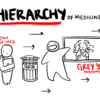Students struggle to fulfill premed requirements during COVID-19 pandemic
Pre-med students express frustrations over decrease in in-person opportunities for research and clinical experience
Between studying for the Medical College Admission Test, shadowing doctors and conducting research, applying to medical school is a stressful experience — especially coming out of the COVID-19 pandemic, students told the News.
Students traditionally shadow physicians and observe them in professional settings in order to document hours for their medical school applications. In addition, students are expected to undertake a rigorous course schedule while conducting hands-on “wet lab” research and gaining direct clinical exposure through volunteer work. However, students told the News that the COVID-19 pandemic made it more difficult to participate in these in-person activities.
“I tried to switch to a wet lab and I couldn’t because no one was doing anything in person, and then once it hit my senior year, no one wanted me because I was a senior now, and they want people who can do multiple years of research,” Kaitlin Kelly ‘22 told the News. “So although there are plenty of opportunities, you have to know how to get them and do them early.”
Kelly, a current neuroscience major on the pre-med track, expressed her frustration with finding opportunities to shadow doctors in New Haven during the pandemic. She found that many University labs switched to a remote format during the pandemic, making it difficult to fulfill pre-med requirements of in-person wet lab experiences.
In addition, according to the Yale New Haven Hospital volunteer webpage, Yale College students have not been able to volunteer at the hospital since March 9, 2020.
Kelly emphasized that in-person wet labs on campus were hard to find.
Instead, Kelly turned to a program at Campus Bio-Medico University of Rome in Italy to gain experience shadowing physicians. She was among 25 students to study abroad this summer at the Doctors in Italy Fellowship Program, which was established in 2018.
Director of Health Professions Advising and STEM Connect Kristin McJunkins told the News that a formalized shadowing program has not been available for Yale students since fall of 2018.
“From a safety and liability standpoint, it became administratively challenging for the hospital to manage so many students in this type of format.” McJunkins wrote in an email to the News. “This didn’t just impact Yale students as there are many other college students in the region.”
McJunkins said she does not anticipate that any formalized shadowing programs will become available after the pandemic.
However, she added that there are multiple virtual shadowing programs not affiliated with Yale that students may complete.
“Volunteering in a clinical setting is one of the best ways to gain an understanding of a clinical setting,” McJunkins said. “Students can also reach out to alumni through Cross Campus to have discussions about someone’s trajectory into medicine to learn more about the profession.”
Other students similarly confirmed that they have struggled to gain clinical hospital experience.
Courtney Li ’24, a pre-med psychology major, said that restrictions put in place due to COVID-19 have impacted how she has been able to prepare for medical school.
“If you’re trying to volunteer at the New Haven Hospital or the [HAVEN Free Clinic,] it’s hard to do so just because of COVID restrictions,” Li explained. “There was definitely a time period where they weren’t accepting volunteers.”
Still, Li explained that she used Yale’s centralized research database where students can find research opportunities in each field, as well as identify professors who are conducting research with undergraduate students. Li told the News that this database has helped her find research opportunities.
Ethelia Holt ’24, a prospective pre-med neuroscience major, told the News that she found connections through Yale’s neuroscience department and undergraduate research pages. She found a retired mentor who was able to guide her through the process of identifying a research laboratory which fit her needs.
Holt also noted the importance of the STARS II Program, which funds summer research experiences for underrepresented Yale College students. She also emphasized how connections and funding through the University can help students to have a more robust laboratory experience.
Yale’s Office of Career Strategy offers resources and advising to all pre-health students.









